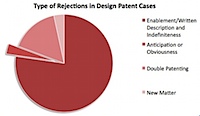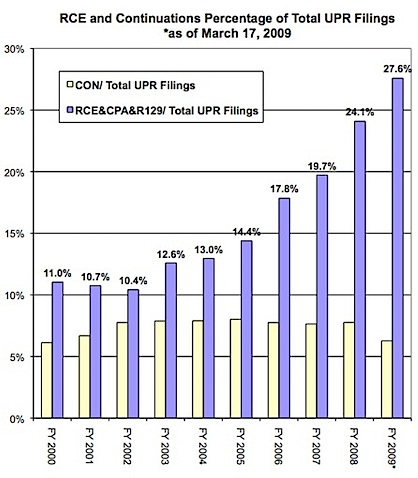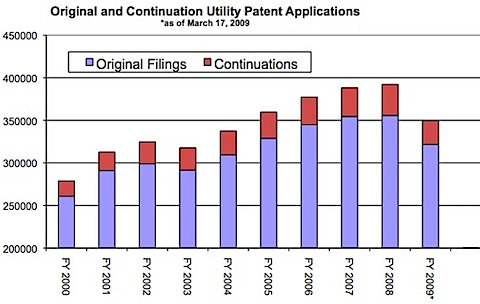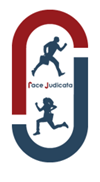The PTO has attempted to implement new rules that limit both the number of continuation applications that may be filed and the number of claims that may be included within each application. The district court issued a summary judgment ruling that blocked implementation of the rules. On appeal, the Federal Circuit has vacated-in-part – finding that some of the limitations on continuations improperly conflict with 35 U.S.C. § 120, but that the remaining limits are "within the scope of the USPTO's rulemaking authority." The case is not finally decided. Rather, the lower court must now decided whether any of the rules are "arbitrary and capricious;" conflict with the Patent Act in ways not already addressed; violated proper rulemaking procedure; are impermissibly vague; or impermissibly retroactive.
Final Rule 78 (Continuations): The PTO's Final Rule 78 would have required that any applicant wanting to pursue more than two continuation applications file a petition "showing that the amendment, argument, or evidence sought to be entered could not have been submitted during the prosecution of the prior-filed application." According to the court, that rule is in conflict with Section 120 of the Patent Act, which entitles the application to the filing date of a prior-filed application. In a concurring opinion, Judge Bryson noted that the conflict arises only because the limit is on the "number of continuations co-pending with the first-filed application."
Final Rule 114 (RCEs): The PTO's Final Rule 114 operated in the same way as Rule 78 except that it applied to Requests for Continued Examination (RCEs) rather than continuation applications. Because RCEs are not implicated by Section 120, the Federal Circuit found no conflict there.
Final Rules 75 and 265 (Claims): These rules would require an examination support document (ESD) for any application that includes more than five independent claims or twenty-five total claims. The ESD includes a preexamination prior art search, a list of the most relevant references and limitations disclosed by each reference, an explanation of how each independent claim is patentable over the submitted references, and an analysis of how each limitation of the claims is disclosed and enabled by the specification. The Federal Circuit found that the lower court was wrong in finding that the PTO exceeded its authority in implementing these rules.
Rulemaking Authority: The initial focus of the court's analysis is on the Rulemaking Authority of the USPTO. 35 U.S.C. § 2(b) gives the PTO authority to "establish regulations, not inconsistent with the law, which . . . (A) shall govern the conduct of proceedings in the office; . . . (C) shall facilitate and expedite the processing of patent applications, particularly those which can be filed, stored, processed, searched, and retrieved electronically . . . (D) may govern the recognition and conduct of agents, attorneys, or other persons representing applicants or other parties before the Office . . . ." The PTO is also required – under Section 132(b) – to "prescribe regulations to provide for the continued examination of applications for patent at the request of the applicant." Although, these rules do not provide any "general substantive rulemaking power" to the PTO, the court will still grant Chevron deference to the PTO's interpretation of "statutory provisions that relate to the exercise of delegated authority."
Substantive v. Procedural: Without substantive rulemaking authority, the case turns on whether the limits are procedural or substantive. This is a difficult question to answer, and the Federal Circuit chose to follow the 1994 JEM case decided by the DC Circuit. In that case, the court found new rules procedural because they did not "foreclose effective opportunity to make one's case on the merits." With that rule as the framework, the conclusion is somewhat easy. The new rules do not "foreclose effective opportunity" – they only require justification for additional continuations and an ESD filing for additional claims.
"[A]pplicants who diligently present all of their amendments, arguments, and evidence as soon as possible during prosecution will be granted as many RCEs as they require. Thus, applications that are submitted in compliance with these timing requirements will be fully examined and given all of the benefits provided by the Patent Act. We do not believe that requiring applicants to raise all then-available amendments, arguments, and evidence by the second continuation application or the first RCE is so significant a burden that applicants will be effectively foreclosed from obtaining the patent rights to which they are entitled."
The Federal Circuit admits that the rules puts a large amount of authority in the hands of the PTO – to grant or reject petitions. However, the court took a wait and see approach: "[The courts] will be free to entertain challenges to the USPTO's application of the Final Rules." Oddly, the Court refused to hold the PTO to any of its official or unofficial public statements regarding how it will interpret the rules. "[T]hese comments do not bind the USPTO."
No Inequitable Conduct Problem: Relying on Kingsdown, the Federal Circuit noted that the ESD requirement is unlikely to cause any inequitable conduct problem for applicants. "[D]oubt about the judiciary's ability to apply its own doctrine in a way that yields fair results and discourages frivolous allegations should not preclude the USPTO from promulgating rules that are within its statutory authority."
Dissent by Rader: Judge Rader would have affirmed "[b]ecause the Final Rules drastically change the existing law and alter an inventor's rights and obligations under the Patent Act, they are substantive and the PTO exceeded its statutory rulemaking authority under 35 U.S.C. § 2(b)(2)."
Notes:
- This case was formerly captioned Tafas v. Dudas.
- In response to the decision, the PTO released the following statement: "The United States Patent and Trademark Office is pleased that the United States Court of Appeals for the Federal Circuit confirmed that the Final Rules are within the agency's rulemaking authority and that the rules regarding requests for continued examination, claims, and examination support documents are consistent with the law. We are further considering other aspects of the opinion, including the Federal Circuit's conclusion that the rule regarding continuations conflicts with the Patent Act."








 Patent Reform: Senator Kyl Introduces the alternative
Patent Reform: Senator Kyl Introduces the alternative 
